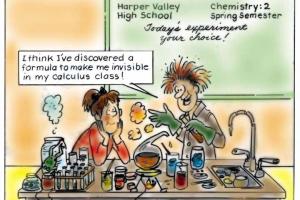Celebrating a Misunderstood Math Miracle: Logarithms Turn 400
National Museum of American History
 Examining actual weapons would be a breach of confidentiality: how they’re made and put together is secret, and the fewer people that know what’s inside a nuclear bomb, the better. Luckily, a group of scientists have devised a way to use math, and neutrons, to figure out if something’s actually a nuclear weapon, without learning anything about what’s inside it.
Examining actual weapons would be a breach of confidentiality: how they’re made and put together is secret, and the fewer people that know what’s inside a nuclear bomb, the better. Luckily, a group of scientists have devised a way to use math, and neutrons, to figure out if something’s actually a nuclear weapon, without learning anything about what’s inside it.
 We have failed to make the honest case for quantum computing—the case based on basic science—because we’ve underestimated the public. We’ve falsely believed that people would never support us if we told them the truth: that while the potential applications are wonderful cherries on the sundae, they’re not and have never been the main reason to build a quantum computer. The main reason is that we want to make absolutely manifest what quantum mechanics says about reality
We have failed to make the honest case for quantum computing—the case based on basic science—because we’ve underestimated the public. We’ve falsely believed that people would never support us if we told them the truth: that while the potential applications are wonderful cherries on the sundae, they’re not and have never been the main reason to build a quantum computer. The main reason is that we want to make absolutely manifest what quantum mechanics says about reality
 All right. Most Portside readers are not into pure mathematics . . . it's too hard, too boring, not relevant to real life, whatever. We hope you'll give this article a chance, even if you don't "get" every detail. It's still a very cool and very rewarding read. And it gives just a taste of what it feels like when a mathematician (or scientist) scores a break though . . . and opens up a whole new, previously unimagined, world. -- Moderator
All right. Most Portside readers are not into pure mathematics . . . it's too hard, too boring, not relevant to real life, whatever. We hope you'll give this article a chance, even if you don't "get" every detail. It's still a very cool and very rewarding read. And it gives just a taste of what it feels like when a mathematician (or scientist) scores a break though . . . and opens up a whole new, previously unimagined, world. -- Moderator
 I certainly agree that theoreticians often find it hard to find empiricists who will make use of their equations. But whose fault is that? Seems to me that the fault often lies with empiricists who stick with their intuitions come hell or high water, and who actively resist the discipline that mathematics imposes on their groundless daydreaming. Intuition is great–as long as it’s only a starting point, and as long as you’re prepared to give it up when it’s proven wrong,
I certainly agree that theoreticians often find it hard to find empiricists who will make use of their equations. But whose fault is that? Seems to me that the fault often lies with empiricists who stick with their intuitions come hell or high water, and who actively resist the discipline that mathematics imposes on their groundless daydreaming. Intuition is great–as long as it’s only a starting point, and as long as you’re prepared to give it up when it’s proven wrong,
Spread the word